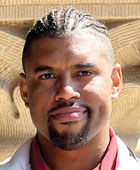Making It to the Ultimate Game Day
Football is the ultimate team sport. Each of the 11 players on the field must work together with skill and in synchrony for the team to be successful.
At the start of my football career as a teenager, I was more of an individual. My family moved twice in three years, so I attended multiple high schools. I was newly diagnosed with type 1 diabetes and was largely managing my health on my own. Offseason training and navigating the recruitment cycle were almost entirely my own responsibility.
I was fortunate enough to be recruited to play college football at Yale University. When I first arrived, however, I quickly appreciated the deficiencies of my individualistic ways. For starters, I was physically weaker than my peers, who had regularly participated in team workouts all through their summers back home. I also struggled with learning our complicated playbook, which required a general understanding of the other positions outside of my own that I hadn’t learned before. Lastly, the athletic training staff was more robust and familiar with diabetes. I was finally being held accountable for my uncontrolled blood glucose levels and was forced to sit out often. For the first time since I started playing, football was no longer fun.
It was really humbling to question whether I belonged on this team and even at this Division 1 level. I knew that if I was ever going to make it, I was well overdue for significant changes in my life. I had to drop my ego, lean into teamwork, and start regaining control of my circumstances, little by little and piece by piece. I had to prove to the coaches that I was coachable and show consistent effort and focus.
I organized a group of other freshman players who were similarly upset over their lack of playing time. Together we went out to the practice fields on our own time, honing our skills and techniques, even with snow on the ground.
I worked closely with coaches and staff to find a diet routine that would best regulate my glucose levels, so that I could more effectively make it through workouts and practices without issues.
I was rewarded by being placed in different positions on the field, so I could land in a spot in which I could best contribute. My role on the team steadily progressed from buried on the depth chart as a freshman, to solid backup as a sophomore, to a starter as a junior, and finally a dominant All-Ivy conference player as a senior. The benefit of teamwork was getting to appreciate my full potential in action!
Today, as a sports psychiatrist, I’ve found a new role on a new team.
I first fell in love with psychiatry in medical school because I discovered how seamlessly one can incorporate one’s personal background into becoming a more effective mental health professional: Who you are is as important as what you know.
Matching into Stanford for residency was a dream come true—I was able to take elective training in the sports psychiatry clinic, and I subsequently stayed on after residency as an attending. It’s an absolute pleasure to work closely with some of the world’s most elite athletes.
Once again, I’m a part of a team, a team that includes psychiatrists, psychologists, nutritionists, athletic trainers, coaches, parents, friends, teammates, and the athletes themselves. This team role is twofold: who I am and what I now know. ■




